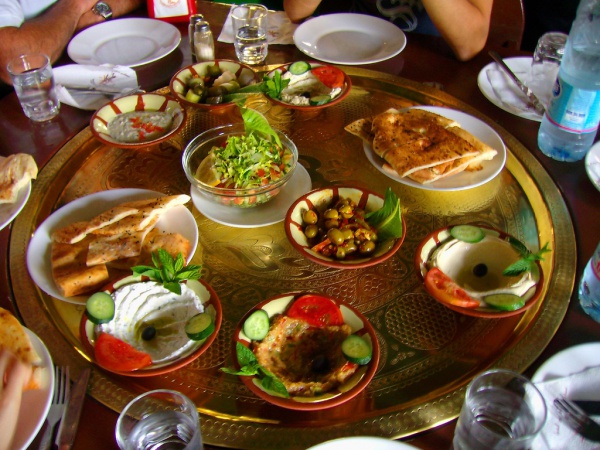Facts About Jordanian cuisine
Jordanian cuisine offers a delightful blend of flavors and traditions that have evolved over centuries, shaped by the region's rich history and cultural exchanges. Rooted in Jordan, this cuisine showcases diverse cooking techniques such as baking, sautéing, grilling, and stuffing a variety of vegetables, meats, and poultry. Olive oil, sourced from Jordan's abundant olive groves, is a staple ingredient in many recipes.
The flavors of Jordanian cuisine are vibrant and distinctive, with dishes often seasoned with herbs, garlic, onions, tomato sauce, and lemon. Za'atar, a blend of herbs, sesame seeds, and sumac, is a cherished spice mix that adds a unique character to many meals. Yogurt, particularly a type called 'jameed,' plays a prominent role in Jordan's national dish, 'mansaf.' This dish is not merely a meal but a symbol of Jordanian hospitality and generosity.
Among the most popular dishes you might encounter in Jordan are hummus, falafel, and an assortment of mezze (small dishes). Bread, rice, freekeh (a type of roasted green wheat), and bulgur are fundamental components of many meals. When it comes to desserts, sweets like baklava and knafeh are favorites, often enjoyed with seasonal fruits.
Beverages are a significant part of Jordanian dining as well. Turkish coffee, tea infused with mint or sage, and Arabic coffee are commonly sipped throughout the day. For those who enjoy spirits, arak, an anise-flavored drink, is often served with meals.
Jordanian cuisine is part of the broader Levantine culinary tradition, sharing similarities with the cuisines of Lebanon, Palestine, and Syria. The influence of the Ottoman Empire and the diverse communities that have inhabited Jordan over the years have also left their mark, making Jordanian food wonderfully diverse.
In Jordan, food transcends mere sustenance; it is a means of expressing hospitality and generosity. Traditional dishes are often prepared for guests during celebrations and social gatherings, highlighting the central role of food in Jordanian culture.
The culinary landscape of Jordan is rich and varied, offering a range of main dishes, mezze, salads, soups, sandwiches, breads, sweets, and beverages. From traditional breads like 'Arbud' and 'Khubz' to indulgent desserts like 'Warbat' and 'Qatayef,' Jordanian cuisine presents a feast for the senses. To complement these flavorful dishes, beverages such as Arabic coffee, refreshing lime-mint juice, and arak reflect the unique culinary heritage of Jordan.

 Iraq
Iraq